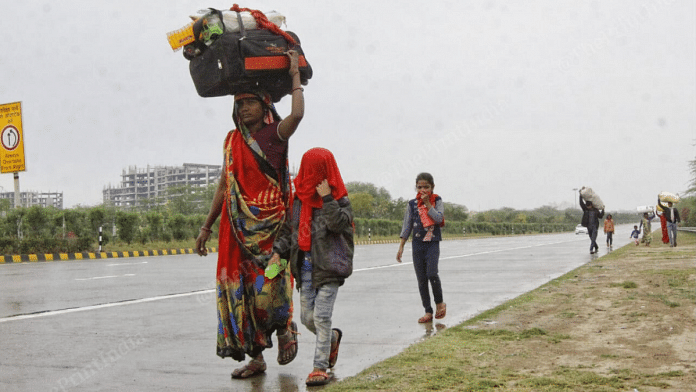New Delhi: There’s been record recruitment under the National Rural Employment Guarantee Act (NREGA) or the Mahatma Gandhi National Rural Employment Act (MNREGA) since April, but up to 22 per cent of applicants hadn’t secured jobs as of 7 July.
These are some of the findings of the new NREGA tracker released Monday by the People’s Action for Employment Guarantee (PAEG), a group of activists, academics and other civil society members who came together to advocate for the scheme in 2004.
The months studied for the new tracker coincide with the Covid-19 lockdown, which made NREGA more important than ever before as the shutting down of cities forced thousands of suddenly-jobless migrant workers back to villages.
The 22 per cent of applicants who hadn’t received a job as of 7 July comes to around 1.7 crore people. The share of applicants who have applied for a job under NREGA since April but haven’t got one is highest for Uttar Pradesh at 30 per cent, followed by Bihar at 24 per cent.
Even so, the tracker notes, the past three months have seen high employment under NREGA, with 7.62 crore households receiving jobs under the scheme in the first quarter of financial year 2020-21, the highest since 2017-18.
The record demand in the first quarter of 2020-21, the tracker notes, has resulted in drying up of funds in some states. In Tamil Nadu and Odisha, the governments have been forced to overdraw wage allocations to the tune of Rs 1,391.61 crore and Rs 91.38 crore, respectively, the report states.
“Funds for NREGA are released in keeping with the labour budget of the states, which usually gets approved in December,” said Nikhil Dey, a social activist who actively works for NREGA. “Hence, the budgets… did not anticipate the Covid-19 crisis and the resultant reverse migration and demand in the state, which has led to a negative balance in the first quarter itself,” he added.
Also Read: Skill mapping, MoUs, changes in labour laws — how Chhattisgarh plans to employ 7 lakh migrants
Tracking performance
NREGA offers 100 days of guaranteed work to adults of rural households every financial year, with an average per-day income of around Rs 200, although different states offer different wages.
The NREGA tracker seeks to provide broad statistics to adjudge the performance of the scheme, like the number of households that have completed 100 days of work, the number of households nearing completion of 100 days of work, amount of funds left with states, a comparison between work demanded and employment provided.
The data is sourced from the website of the Ministry of Rural Development, the nodal government ministry for the scheme.
According to the tracker, states like Bihar, Madhya Pradesh and Uttar Pradesh, which have the highest share of dejected applicants, also have less than 10 per cent of their allocated funds left. This could have two potential consequences on the ground. Local officials will either stop registering more applicants, or wage delays.
“The tracker is a very vital piece to inform society about the progress under the scheme in a lucid way. This, in turns, helps in a much more informed decision-making process for NREGA,” Dey said.
Also Read: Jobless in villages amid floods — Assam’s returning migrants brace for fight to stay afloat



